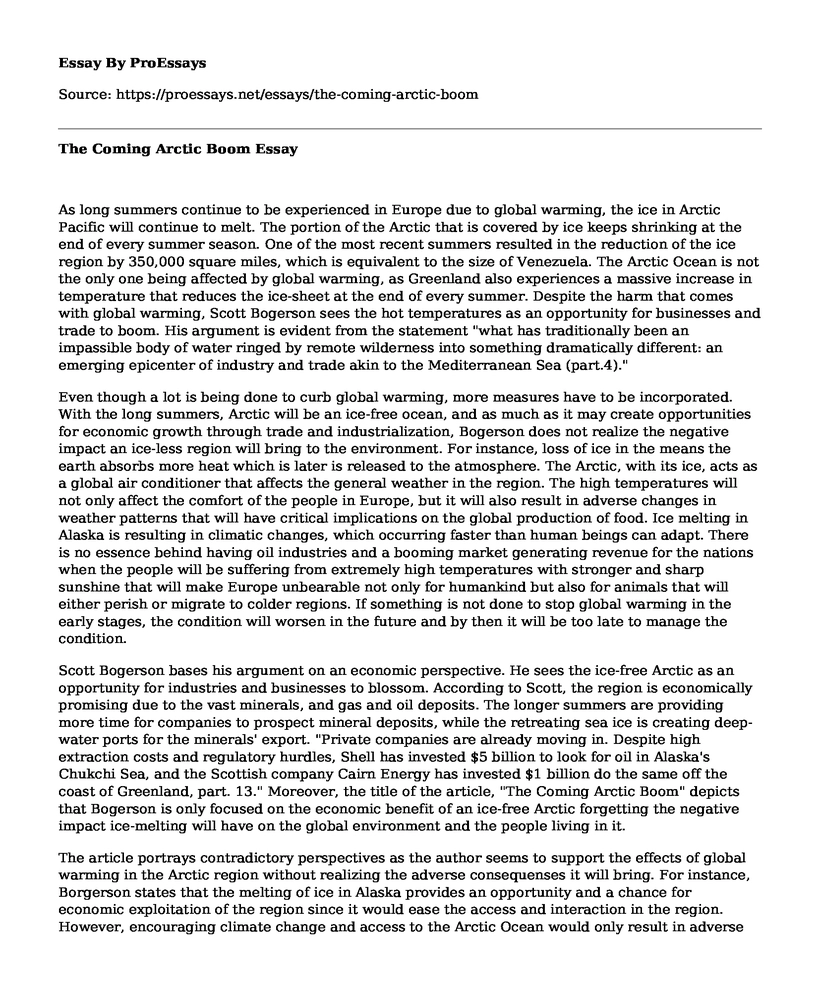As long summers continue to be experienced in Europe due to global warming, the ice in Arctic Pacific will continue to melt. The portion of the Arctic that is covered by ice keeps shrinking at the end of every summer season. One of the most recent summers resulted in the reduction of the ice region by 350,000 square miles, which is equivalent to the size of Venezuela. The Arctic Ocean is not the only one being affected by global warming, as Greenland also experiences a massive increase in temperature that reduces the ice-sheet at the end of every summer. Despite the harm that comes with global warming, Scott Bogerson sees the hot temperatures as an opportunity for businesses and trade to boom. His argument is evident from the statement "what has traditionally been an impassible body of water ringed by remote wilderness into something dramatically different: an emerging epicenter of industry and trade akin to the Mediterranean Sea (part.4)."
Even though a lot is being done to curb global warming, more measures have to be incorporated. With the long summers, Arctic will be an ice-free ocean, and as much as it may create opportunities for economic growth through trade and industrialization, Bogerson does not realize the negative impact an ice-less region will bring to the environment. For instance, loss of ice in the means the earth absorbs more heat which is later is released to the atmosphere. The Arctic, with its ice, acts as a global air conditioner that affects the general weather in the region. The high temperatures will not only affect the comfort of the people in Europe, but it will also result in adverse changes in weather patterns that will have critical implications on the global production of food. Ice melting in Alaska is resulting in climatic changes, which occurring faster than human beings can adapt. There is no essence behind having oil industries and a booming market generating revenue for the nations when the people will be suffering from extremely high temperatures with stronger and sharp sunshine that will make Europe unbearable not only for humankind but also for animals that will either perish or migrate to colder regions. If something is not done to stop global warming in the early stages, the condition will worsen in the future and by then it will be too late to manage the condition.
Scott Bogerson bases his argument on an economic perspective. He sees the ice-free Arctic as an opportunity for industries and businesses to blossom. According to Scott, the region is economically promising due to the vast minerals, and gas and oil deposits. The longer summers are providing more time for companies to prospect mineral deposits, while the retreating sea ice is creating deep-water ports for the minerals' export. "Private companies are already moving in. Despite high extraction costs and regulatory hurdles, Shell has invested $5 billion to look for oil in Alaska's Chukchi Sea, and the Scottish company Cairn Energy has invested $1 billion do the same off the coast of Greenland, part. 13." Moreover, the title of the article, "The Coming Arctic Boom" depicts that Bogerson is only focused on the economic benefit of an ice-free Arctic forgetting the negative impact ice-melting will have on the global environment and the people living in it.
The article portrays contradictory perspectives as the author seems to support the effects of global warming in the Arctic region without realizing the adverse consequenses it will bring. For instance, Borgerson states that the melting of ice in Alaska provides an opportunity and a chance for economic exploitation of the region since it would ease the access and interaction in the region. However, encouraging climate change and access to the Arctic Ocean would only result in adverse and extreme global warming due to the diverse human activity. Borgerson's economic ideology contradicts the environmentalists' perspective to preserve the environment to eradicate the adverse effects of global warming and climate change. Therefore, the article shows the authors ignorance of the negative effects of global warming as he only focuses on the economic advantages of the phenomena. Despite advocating for global warming, the author ironically ascertains on the chaos and environmental disorder of the effects of climate change such as the migration of flora and fauna. It portrays the globally acknowledged contradiction between the positive and negative effects of climate change, which often creates a dilemma. Further, the article depicts some contradictory phenomena as Borgerson tries to explain the scientists' prediction for the melting of the Arctic ice but irrespective of the utilization of diverse scientific methods and instruments, the author ascertains the inability of qualified scientists to agree on the relative approximation of the melting of the Arctic Ocean.
Cite this page
The Coming Arctic Boom. (2022, Nov 06). Retrieved from https://proessays.net/essays/the-coming-arctic-boom
If you are the original author of this essay and no longer wish to have it published on the ProEssays website, please click below to request its removal:
- E-Commerce Development in China
- Personal Statement on Technology and Digital Use in the Education Sector
- International Business Perspective Essay
- Essay Sample on Distribution of Membership and Health Care
- Bone of Contention on Gay Parenting Essay Example
- Essay Sample on eWOM
- Free Report on Unlocking Success: Google's Online Marketing Triumph for Oct8 Fashion







